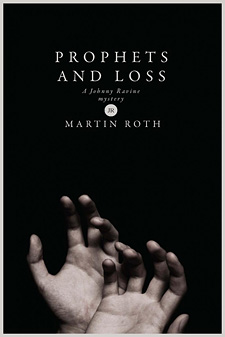Grant Stonelea has been found murdered in the bondage room of a Melbourne brothel, his hands bound with leather straps and a page from the Bible stuffed in his mouth. His wife Melissa has not only lost her husband. She has lost her self-respect and the memories of her short-lived marriage take on a different, darker hue. She vows revenge.
But it’s not only Melissa Stonelea who has an interest in unravelling the circumstances leading up to her husband’s death. Pastor Ron Thomas, the gravelly-voiced, retired outback missionary who lead Grant to Christ is nervous that the media will have a field day with the story. So, for the sake of his suburban congregation, he enlists Johnny Ravine, private detective and friend to the Stonelea’s, to find out what really happened.
 Prophets and Loss is Martin Roth’s first published novel. In it Roth, an accomplished financial writer, takes his readers on a thrilling ride that begins as a story of murder and revenge and ends as a reflection on loss and forgiveness. Readers are hurried between Melbourne brothels, global stock markets and East Timorese mountains as the murdered Grant’s pre-conversion life is graphically seen to come back and haunt him.
Prophets and Loss is Martin Roth’s first published novel. In it Roth, an accomplished financial writer, takes his readers on a thrilling ride that begins as a story of murder and revenge and ends as a reflection on loss and forgiveness. Readers are hurried between Melbourne brothels, global stock markets and East Timorese mountains as the murdered Grant’s pre-conversion life is graphically seen to come back and haunt him.
But it is the story of Johnny Ravine which occupies the greater emotional involvement of the reader. And as the story unfolds it becomes apparent that his past and Grant’s past are dangerously intertwined. By the end of the story Melissa’s quest for revenge has given way to Ravine’s own internal struggle.
Prophets and Loss is fast paced and edgy without being vulgar or gratuitous (which is saying a lot given the graphic circumstances surrounding Grant Stonelea’s death!). Roth’s stock market knowledge shines through without being ostentatious. And the story’s setting within the suburbs of Melbourne is a natural and believable one. The book is attractive, well set out and at just over 200 pages not overly long.
However I am left disappointed by Roth’s characters. They remain aloof. Too often their dialogue is simplistic and unnatural. Pastor Ron Thomas is given a particularly one dimensional treatment. As one who might be expected to speak words of life into the story, he disappoints by giving mainly hackneyed answers to the difficult questions about God, death, revenge and forgiveness that are asked by the story’s characters and by me.
These criticisms aside, Prophets and Loss is worth reading. It has reminded me that forgiveness is never easy, that too often Pastor Thomas’ shallow platitudes find their way onto my own lips. And it has reinforced in me the truth that in order to begin the process of forgiveness we must turn away from our anger and our revenge and, instead, run to the one who is able to sympathise with our weaknesses, who has been tempted in every way, just as we are, and yet was without sin.




























